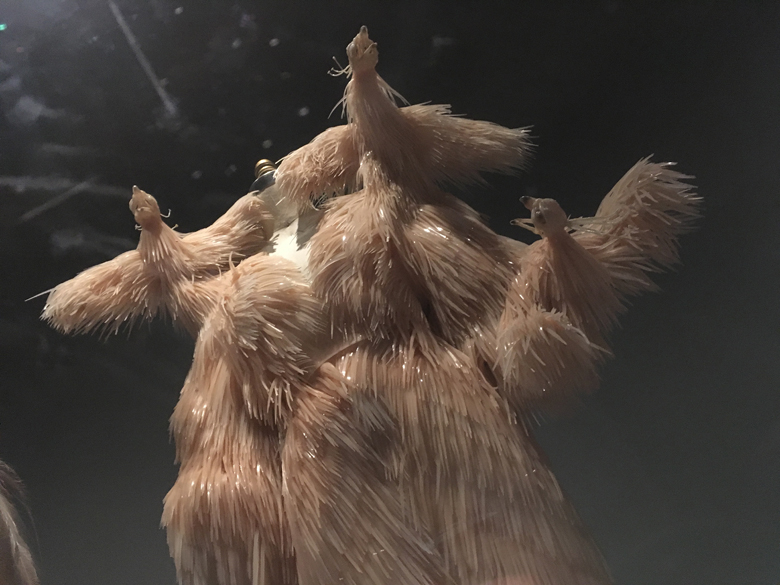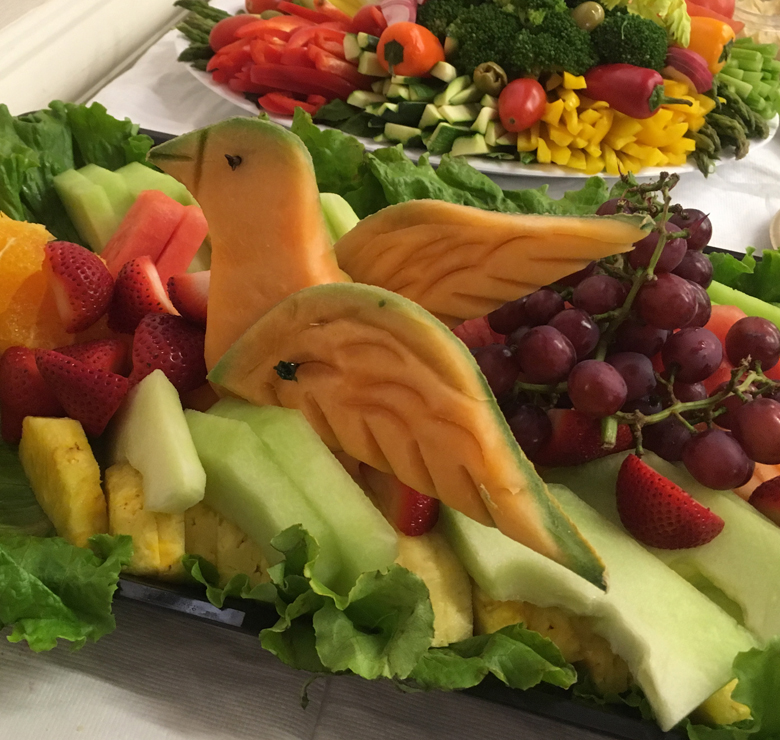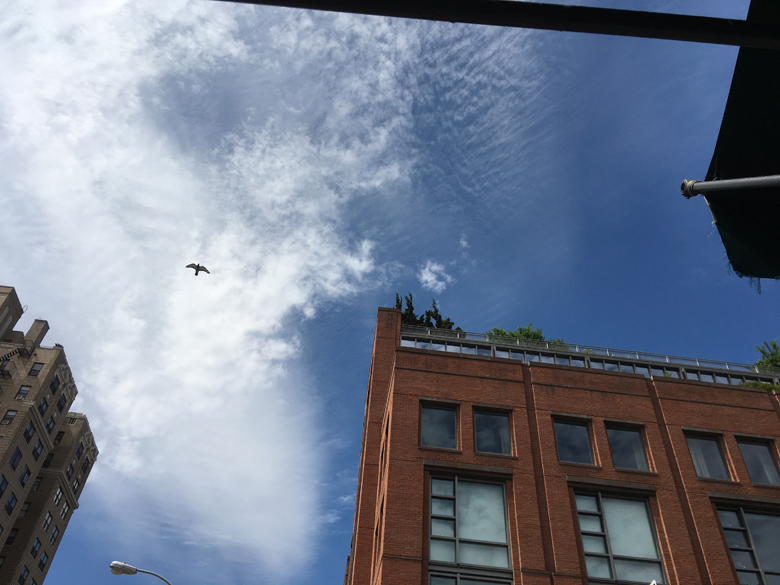
CXLIX
Rete mirabile: a term coined, it is said, by Galen to describe the complex of arteries and veins found in mostly warm-blooded animals. Galen figured, based on his dissection of a sheep, that such a “wonderful net” existed in the necks of human beings. It took fourteen hundred years before the great anatomists of the 16th century said “baaa” to his theory.
Among other seabirds, gulls, though unable to invent, much less use a laser-cutter and apparently disinterested in haute couture (or cuisine), possess a gland with a rete mirable that allows them to drink salt water and “sneeze” the brine out, extending their range far from freshwater sources.
In other birds and mammals, including dogs, the rete mirable serves as a thermostat, permitting extremely efficient heat exchange between venous and arterial systems, regulating the temperature between cold inward and hot outward blood flows. It also functions to either reduce or conserve heat in one or another part of the body. More information may not be found at www.retemirable.com. [Winking smiling face emoticon here]
A stylish young woman passes the red bench wearing a teeshirt that reads Haute Mess.
Ethics to ethics, dust to dust
Fifth-ave., at the lower end, set a good example to its residents of what use to put their courtyards to during parade and celebration days. Miss [Serena] Rhinelander, who lives at Fifth-ave. and Washington Square North, had the pleasure of entertaining over 1,000 poor children on the commodious stand which she had built in her yard in Fifth-ave.… the Rhinelander [stand was] purposely draped with red bunting, to contrast with the white Memorial Arch, which is directly opposite… William Rhinelander Steward, a nephew of Miss Rhinelander, had charge of her stand while the children, represented [?] the pupils of the New York State Institutions for the Education of the Deaf, Dr. Peet’s, 150 children and Mr. Greene’s 100, and pupils of the Children’s Aid Society Schools; the Rhinelander School, 150; Cottage Place School, 200; West Side Italian School, 150; and the Sunday-school of Grace Protestant Episcopal Church, 200.
The children were all supplied with flags and these they waved with glee as the procession passed, the movement of the flags being in unison with the music of the bands. The little deaf mutes clapped their hands at the pretty sights and waved their flags in time with those who could hear the music. Thanks to the careful management of Mr. Stewart, not one of the thousand children on the stand was hurt, although at times it was difficult to keep them in their places, so interested and excited they would become. Miss Rhinelander’s kind act carried sunshine into many little hearts yesterday. [from “Happiness for a Thousand Children. Miss Rhinelander Entertains a Regiment of Young People at Fifth-Avenue, and Washington Square,” New-York Daily Tribune, October 13, 1892, p. 13, reporting on the fourth centenary celebration of Columbus’ arrival on this here hemisphere.]
Text and texture
Dreamonthenes: The Sleeping Philosopher
Philofficer: The Kindly Kop
Text. Sure.
Tronie: a Dutch genre of fancy-dress portrait busts.
Were some of these paintings tranny-tronies? Who’s to say?
For the Danaans, Peleus’s son then set out
a display of prizes for the third contest,
the hard-fought wrestling match. The winning prize
was a huge tripod to place above a fire,
whose value among themselves the Achaeans set
at twelve oxen.
Into the middle of the crowd
he then brought out the loser’s prize, a woman
skilled in every kind of work, worth four oxen.
He rose and said among the Argives,
“Stand forward, you who will essay this contest.”
[Homer, The Iliad, Book XXIII]
In what some consider a stunning breakthrough across disciplines from biology to archaeology to linguistics, a duo of scientists recently discovered fossil evidence of both vowels and consonants scattered, seemingly at random, within the residue of the so-called primordial soup. “It’s almost as if it were waiting for some meta-brain to form words and sentences,” commented Omar Renfrew, editor of the journal Nature, which published an article announcing the find its current issue. Michael Unrath, co-author of the article said it was too early to attempt to “read,” much less ascribe meaning to the letter-like forms he and his colleague Demetrios Marbre, also a professor of Abiogenic Studies at the University of Manchester, England, have identified.
Echoing his colleague, Marbre said: “I would only caution people to be wary of ascribing any particular order to these apparent figures, however tempting it might be.”
And indeed it is tempting to attempt to make sense of these alien, yet familiar shapes. To this reporter’s eye, one cluster of proximal or overlapping shapes suggests PATH MINED. But with the addition of a G that seems to lie slightly outside the group, one may read MIND THE GAP.“I’m sure many other arrangements are possible,” cautioned Marbre, “such as with the cluster that could be combined to form E PLURIBUS UNUM. It’s one of several readings, and we have, as yet, no way of knowing whether such a structure exists intrinsically, or whether we are imposing it on the material.”
Renfrew stated that it may be impossible to control a potentially limitless number of interpretations, but suggested that “in the end, this may not be a bad thing.”
If g*d gives you nails, make nail soup
A hot mess was the origin of life, so they say
It matters not which phone you own
For all do make of man a drone
Google is my co–Pilates
Dude, check this out – it’s like this awesome app I downloaded the other day: 23rd Somethingorother. It does like, literally, everything. I mean, it’s like, like my shepherd – it knows what I want before I want it, so, like, I really don’t want anything. It makes me lie down in green pastures, like really green. It leads me by the still waters. So, then, like if I get bored with still waters, it gives me rapids, like whitewater dude, before I’ve even…
The Greeks… claim the first statues (according to Diodorus) were invented by the Ethiopians, then taken over by the Egyptians, from whom the Greeks took them over, since even in Homer’s times sculpture and painting were evidently perfect, as that godlike poet attests to in his descriptions of Achilles’ shield, which with all the artistry he describes to us as more sculpturally formed and painted than described with words. Writ Vasari in his preface to the Li(v)es…, 1568. Huh?! As if…
Proposal: that the bald eagle be dis-appointed as the national bird and the drone enshrined in its place
I enrolled in vacational school and it’s the last anyone ever sawn of me…
Saul, now Paul, traveled wildly after his conperinversion, challenging every doxa he could tongue-lash. When he couldn’t reach their ears directly, why, he’d epistle-whip ‘em from a distance…
I was a Rude Mechanical for the Duke of Athens…
I wuz a votive offering to the gods of…
The drones are coming home. But not to roost…
I was a lethal robot for the Dallas PD
A host of new acronyms coming online, among them:
EBD: Execution by Drone
MRCA: Most Ridiculous Course of Action
TAWAN: Totally Awesome Wanton Ambling Nymph [pace Chris Marlowe]
ELD: Epic Looting, Dude [alt. LELD: Like Epic Looting, Dude]
Hot Mesopotamia
Sandboxhurst, British military academy for toddlers
LOL: Looting On-line ; }
TZO: Totally Zika’d Out [as in “going viral”]
And traces of polychrome danced in their heads
Bring me something not made by slaves
Excoriades, the whipping philosopher
Under the general heading food, there are often-overlooked but real distinctions, as well as overlaps among: The Edible, The Digestible and The Nutritive
We don’t need no word balloons…
Hey, artist,
leave those ‘toons alone!
Bewigged, bonkers and befuddled
What if you don’t train for strength, but your training makes you stronger?
What if you don’t train for speed, but your training makes you faster?
What if you don’t train for flexibility, but your training makes you more agile?
What if you don’t train for inner peace, but your training makes you calmer?
What if you don’t train for longevity, but your training preserves your health?
Is it possible that everything grows out of the interplay of up and down, in and out, forward and back, stillness and motion?
Can opposing forces create a dynamic equilibrium?
Where is the border between the individual and social life?
Thoughts overthunk
The thinker sunk
The Prussian military thinker Carl von Clausewitz referred to friction as “the force that makes the apparently easy seem so difficult.” Clausewitz’s notion of friction in warfare also applies to us as individuals, particularly when we are trying to get something done, and this friction is magnified as we interact with others, or as part of a group, an organization, or a large enterprise. What affects our actions and derails even the best-laid plans, or keeps us from even making coherent plans, is the fact that we are always dealing with a changing environment and therefore are always to some degree acting in ignorance. Not only do we have limited knowledge to begin with, but we also have to cope with unpredictable events that can never be completely anticipated. This situation is made even worse by the imperfect transmission and processing of information. Even the things that theoretically can be known are not completely reliable because they are subject to personal opinion and emotion, opposing agendas between individuals, mistakes, and/or even the inability to process the volume of information. Emotion and stress can also affect our ability to negotiate life smoothly, or to get the kinds of outcomes we want in our work and personal life.
This kind of subjectivity can lead to actions that are based on selected temporal aspects of a situation, rather than identifying the more general trends and circumstances of which the situation is but a single part. It can also lead to an orientation that causes underestimating or overestimating what is possible in a given situation. In the words of Michael Handel, former professor of strategy at the U.S. Naval War College, “Particularly in military affairs, reality is surprisingly elusive. In fact the higher the level of decision making, the more reality is likely to be distorted by wishful thinking, political considerations, ideological biases, poor intelligence, past experience, partial information, and individual and organizational interests.” [From Tom Bisio, Beyond the Battleground: Classic Strategies From the Yijing and Baguazhang for Managing Crisis Situations, Berkeley, CA: Blue Snake Books, 2016. p. 174.]
What if there were no other possible worlds and we had to live with and in this one?
Frog and fiction, blow me to Bermuda!
I know it sounds a bit bizarre…
I know it sounds a bit bizarre…
I know it sounds a bit bizarre…
I know it sounds a bit bazaar…
But with Kemalists
(Kemalists)
It’s how conditions are…

